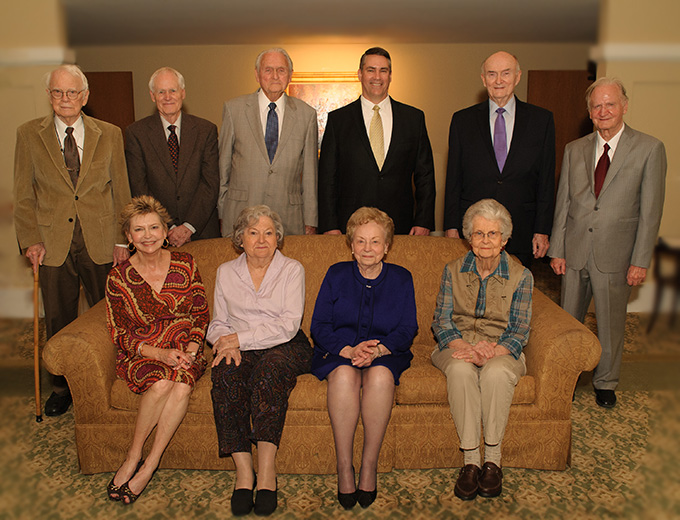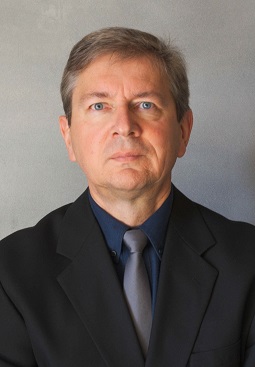Herz named first holder of Distinguished Chair in Alzheimer’s research
By Patrick Wascovich
Generous funding from the Presbyterian Village North Foundation has established a new Distinguished Chair in Alzheimer’s Disease Therapeutic Research at UT Southwestern, with Dr. Joachim Herz recently named as the inaugural holder. Dr. Herz’s research focuses on ways to prevent Alzheimer’s disease or halt its progression by deciphering the work of a receptor protein called ApoE.

Members of the board of trustees of the Prebyterian Village North Foundation
“I am honored and grateful to be named the first holder of the Distinguished Chair established by the Presbyterian Village North Foundation,” said Dr. Herz, Professor of Molecular Genetics, Neuroscience, and Neurology and Neurotherapeutics at UT Southwestern’s Peter O’Donnell Jr. Brain Institute.

Dr. Joachim Herz
“This Chair will directly benefit and support the work conducted in the Center for Translational Neurodegeneration Research, which targets the three most prevalent and thus most important disease mechanisms that cause dementia during aging: Alzheimer’s disease, frontotemporal dementia, and metabolic syndrome – a disorder of systemic energy balance that leads to obesity, diabetes, atherosclerosis, and vascular disease,” he said. “Together, these are the most frequent secondary risk factors that promote memory loss during aging.”
“The PVN Foundation is thrilled to have such an internationally recognized physician-scientist filling the Foundation’s endowed Distinguished Chair in Alzheimer’s Disease Therapeutic Research,” said Billye Joyce Miars, Chair of the Foundation.
In 2014, the Presbyterian Village North (PVN) Foundation’s board of trustees gave $1 million to Southwestern Medical Foundation to support Alzheimer’s research at UT Southwestern. The North Dallas senior living community made this gift partly in response to the work of Dr. Myron Weiner, UT Southwestern Professor Emeritus of Psychiatry, and Dr. Paul Chafetz, who helped establish the Alzheimer’s Disease Care Wing at PVN in the mid-1990s.
“We greatly appreciate Presbyterian Village North Foundation’s commitment to helping unravel the mysteries of this disease and finding breakthroughs for the treatment of Alzheimer’s patients through research,” said Dr. Daniel K. Podolsky, President of UT Southwestern. “This support will foster further collaboration among those working to understand and prevent Alzheimer’s disease.”
The Center for Translational Neurodegeneration Research is directed by Dr. Herz, a physician-scientist known for his groundbreaking research into how a mutation in a protein triggers Alzheimer’s disease, which affects 5.3 million people in the U.S. and is the country’s sixth-leading cause of death.
One of the telltale signs of Alzheimer’s is sticky plaques of ß-amyloid protein, which form around neurons and are thought by many scientists to bog down information processing and kill cells. Dr. Herz’s most recent work has shown that Apolipoprotein E (ApoE) receptor signaling is essential to protect against rising amyloid levels.
In his team’s investigation, mice that accumulated even a small amount of amyloid were unable to learn a standardized behavioral task. This innovative mouse model has since been used in another study to show that the learning defect can be completely reversed with a drug that reduces the production of a specific amyloidogenic peptide. Taken together, Dr. Herz said, the studies provide clear experimental proof for the mechanism by which ApoE receptors protect against amyloid-induced synaptic dysfunction and memory loss.
Dr. Herz’s metabolic syndrome investigations have shown that the same receptors that interact with ApoE also regulate insulin receptor trafficking in the liver. Analysis of these genetic mouse models, he said, will be useful to understand how high-fat diets and insulin resistance in humans can promote Alzheimer’s disease.
“The support generated by the Presbyterian Village North Foundation Distinguished Chair in Alzheimer’s Disease Therapeutic Research will enable us to push the boundaries of our research,” Dr. Herz said. “It will enable us to advance our knowledge and explore conceptually novel approaches to drug development. As always, pushing the boundaries of science entails taking risks and learning from failure. This can only be achieved with bold and flexible venture funding, such as the kind supported by this Distinguished Chair.”
Dr. Herz, a faculty member at UT Southwestern since 1989, graduated from medical school at the University of Heidelberg in Germany in 1983. He completed his surgery residency in Germany and England before joining the European Molecular Biology Laboratory in 1985. There, he received training in molecular biology and conducted research work that included the identification and cloning of a novel member of the LDL receptor gene family, the LDL receptor-related protein.
His numerous awards include receiving Germany’s highly respected Heinrich Wieland Prize in 2007 for his research related to lipid and cholesterol regulation. He was cited for his discovery of novel and essential functions of lipoprotein receptors in the transmission of signals between cells.
Dr. Herz also holds the Thomas O. and Cinda Hicks Family Distinguished Chair in Alzheimer’s Disease Research.
Dr. Podolsky holds the Philip O’Bryan Montgomery, Jr., M.D. Distinguished Presidential Chair in Academic Administration, and the Doris and Bryan Wildenthal Distinguished Chair in Medical Science.
